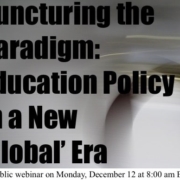Mario Novelli
Brexit and Education: an update
It’s been over two months since the United Kingdom voted to leave the European Union. Right after it happened, I invited Prof. Susan Robertson on FreshEd to talk about the possible consequences the Brexit vote would have on education. During that conversation, I asked if this vote would open the possibility for a new left to emerge within the British Labour Party.
Well, how have things turned out?
To update the situation in the United Kingdom, I recently spoke with Mario Novelli. Mario Novelli is Professor of the Political Economy of Education and Director of the Centre for International Education (CIE) at the University of Sussex. For years, Mario has followed the solidarity work of Jeremy Corbyn, who is now Leader of the labour party and currently in a leadership battle with Owen Smith.
This short episode of FreshEd has been taken from a longer conversation I had with Mario about his research on inequality and education, which will air on September 12.
Citation: Novelli, Mario interview with Will Brehm, FreshEd, podcast audio, September 2, 2016. https://freshedpodcast.com/brexiteducation-update/
Will Brehm 1:14
Mario Novelli, welcome to FreshEd.
Mario Novelli 1:16
Thanks very much for having me.
Will Brehm 1:19
Can you tell us about your involvement in the Labour Party and the current sort of upheavals, since Brexit and some of your opinions about, say, Jeremy Corbyn?
Mario Novelli 1:30
Well, I actually am a recent returner to the UK. So, I spent much of my adult life living in different parts of the world. So, over the years, I’ve lived in India, Palestine, Egypt, Colombia. And from 2006 to 2010, I moved to Amsterdam, and then eventually came back to the UK in 2010. So, I’ve been back in the UK for six years. So, since I’ve been back, I’ve kind of started to engage a bit more actively in UK national politics. And in a sense, I don’t see this so differently anymore from my own work in international development. I’m a big fan of Boaventura de Sousa Santos, the Portuguese philosopher and lawyer. And he argues that when we talk about the South, we use it as a metaphor for all those people that are left out of the benefits of the contemporary capitalist system. And that allows you to think about those that are not left out of that in the global South. So, for example, the North in the South -those massively wealthy elites that live in Colombia and different parts of the world. And it also allows us to talk about the South in the North -those people that are in wealthy industrialized countries but actually are completely marginalized. And so, my engagement in politics is really from that perspective, and an interest in those that are marginalized from the present system. And, you know, for that reason, I’ve been involved in lots of solidarity movements over the years for the last two decades. Active in refugee solidarity work in the UK with Colombian communities, with other communities. And I think it was really through that, that for the first time in my life, I decided to join the Labour Party when Jeremy Corbyn last summer stood in the election and there was a momentum that gathered around him. And I did that really, because Jeremy Corbyn is somebody that I’ve known for quite some time. He’s always been active in solidarity movements. He’s always been a backbencher, a rebel, inside the Labour Party. And suddenly the Labour Party was expressing some of the things that I firmly believe. It’s not just about inequality, and the marginalization of large swathes of the population in the UK, but also about foreign policy. You know, the disastrous wars in Iraq and Afghanistan and the legacies of that that we still live with. Jeremy Corbyn has a very principled history in both of those and I think that that’s the reason why I decided to join the Labour Party and started to get actively involved.
Will Brehm 5:03
What has happened since Brexit? We’ve done a show on Brexit with Susan Robertson, just as it happened, basically. And it would be good to just kind of get an update from you about what has happened in the UK since Brexit, particularly for the Labour Party?
Mario Novelli 5:23
Yeah, okay. Well, I mean, if you’ve done a show, I won’t fill in too many of the details. I’m sure people are very aware. Everywhere I go people are talking about Brexit. But essentially, for many of us, we were not necessarily Europhiles obsessed with Europe. We recognize the limitations of Europe. The problems, particularly in the way Europe has treated Greece over recent years after the global economic crisis. And so there has been a dissatisfaction, I think, amongst the left for Europe. But I think overwhelmingly, most of the left actually favored to stay in the European Union. And what it seemed to be, that the whole process of Brexit looked like an internal conservative party feud. You had, on the one hand, David Cameron, and on the other, Boris Johnson, two elite, private school-educated conservatives, battling over whether to stay in or stay out. So, there was a bit of a sense, for many of us of non-participation in that discussion. And this seems to have panned out in different ways in different parts of the country. I think that the UK Independence Party, along with the right of the Conservative Party, managed to mount a campaign to suggest that voting against the government and voting against Europe was, in a sense, an act of rebellion. And I think there are many disaffected people, poor people in this country that wanted to demonstrate their anger through that.
There was also, I think, a strong element of racism that was used across the whole campaign, which led to this idea that all the problems that many communities were facing were the fault of immigrants, and particularly European migrants, rather than the role of the banks, the role of the unequal distribution of wealth in the country, etc. And so, for a range of reasons, there eventually was a 52-48 split in the vote, and Britain voted to exit the EU. So, that’s the kind of background to that. Jeremy Corbyn, like many of us, was eventually resigned to staying into the European Union but didn’t probably engage as much as he might have and as much as many of us might have in the remain campaign. And in fact, I would go even further to say that it wasn’t that they just didn’t engage, they did engage. But even the media wasn’t interested in what the left was saying, what Labour was saying about remain. They were following around UKIP and Boris Johnson or David Cameron. And so there really wasn’t space for a different debate. And after the announcement, I think what happened was that those members of the Labour Party, the parliamentary Labour Party, who were deeply disappointed that Jeremy Corbyn won the leadership of the Labour Party -and he did it not on the basis of the support of Labour Party members of parliament but on the membership, which has increased massively over the last years- saw Brexit as a moment of possibility to attack Jeremy Corbyn and blame him for the failure to remain in the EU. And so, they used that chance. If Brexit didn’t happen, and the vote went the other way, I’m sure that by now they would have found another reason to go for deselection of Jeremy Corbyn and to try to unseat him.
So, essentially after Brexit, the members of Parliament from the Labour Party resigned from the Shadow Cabinet one by one and tried to force him to resign, eventually forcing a Labour leadership election which is ongoing in an attempt to de-seat him. The people that are in Parliament now, many of the members of parliament in Labour, and many of the administrators that work for the Labour Party grew up under Tony Blair, grew up under New Labour, and they believe that they own the Labour Party. But in fact, their New Labour was a relatively new phenomenon. And the Labour Party itself has a much longer history that was born out of the trade union movement, and the fight for decent fair labor, etc. for social justice. And so, in a sense, while we feel that we’re reclaiming the Labour Party, they feel that we are stealing it. And hence there is a very difficult civil war going on inside the Labour Party to determine its future, with the result being announced in the middle of September. But I’m sure that if Jeremy Corbyn wins, and I’m pretty confident that he will win, then it’s likely that these Labor Party members will continue with their revolts. So, it’s a difficult period.
Will Brehm 11:37
Well, we’re going to have to watch it very closely. So, middle of September is when the results should be in. Well, Mario Novelli, thank you so much for joining FreshEd. It was really wonderful to talk on so many different topics.
Mario Novelli 11:48
Thank you very much for inviting me.
Coming soon!
Coming soon!









